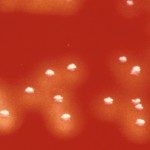Lien vers Pubmed [PMID] – 33876229
Lien DOI – 10.1093/cid/ciab337
Clin Infect Dis 2022 Jan; 74(1): 8-16
Listeriosis is caused by the foodborne pathogen Listeria monocytogenes. It can present as a maternal-neonatal infection. We implemented a nationwide prospective cohort and analyzed the features of neonatal listeriosis.We studied all neonates born alive from mothers with microbiologically proven maternal-neonatal listeriosis enrolled from November 2009 to December 2017. We analyzed presentation, neonatal outcome at discharge, and predictors of severe presentation and outcome.We studied 189 infants; 133 of 189 (70%) had abnormal clinical status at birth, including acute respiratory distress in 106 of 189 (56%). There were 132 of 189 (70%) infants who developed early-onset listeriosis and 12 of 189 (6%) who developed late-onset listeriosis; all presented with acute meningitis. There were 17 of 189 (9%) infants who had major adverse outcomes: 3%, (5 of 189) death; 6% (12 of 189), severe brain injury; and 2% (3 of 189), severe bronchopulmonary dysplasia. Fifteen of 17 infants were born <34 weeks of gestation (P < .0001 vs infants born ≥34 weeks of gestation). Maternal antimicrobial treatment ≥1 day before delivery was associated with a significant decrease in presentation severity for the infant, resulting in significantly fewer inotropic drugs, fluid resuscitation, and mechanical ventilation requirement (odds ratio, 0.23; 95% confidence interval, 0.09-0.51; P < .0001).Antenatal maternal antimicrobial treatment is associated with reduced neonatal listeriosis severity, justifying the prescription of preemptive maternal antimicrobial therapy when maternal-fetal listeriosis is suspected. Neonatal outcome is better than reported earlier, and its major determinant is gestational age at birth.NCT01520597.










